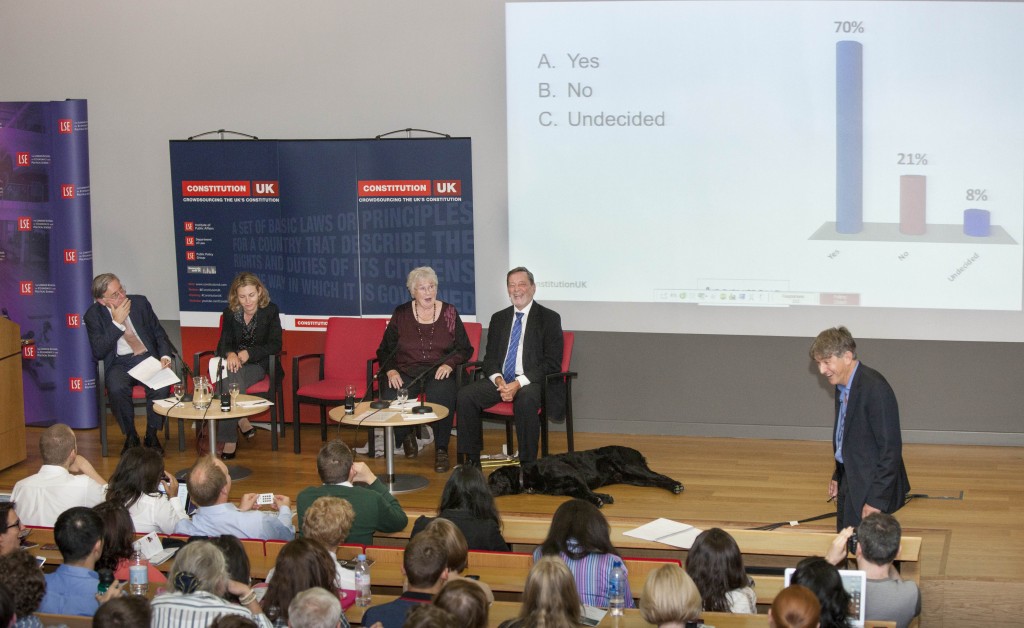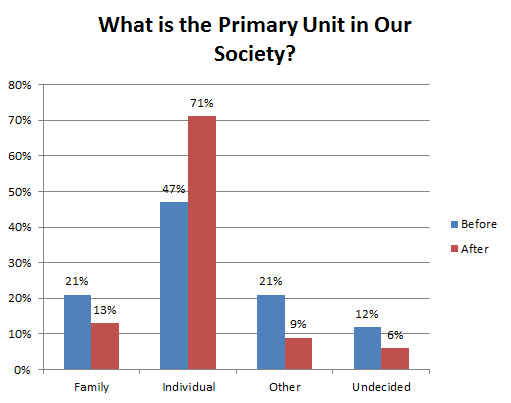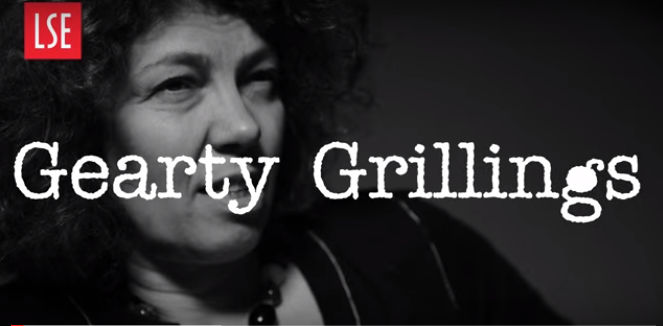
![]() One week ago, on Tuesday 8 October 2013, we hosted our first ConstitutionUK event, “Crowdsourcing a New UK Constitution“. It was a great success and we’d like to take the chance to thank everyone who managed to come along and everyone else who participated online via Twitter and our website in the run-up to the event.
One week ago, on Tuesday 8 October 2013, we hosted our first ConstitutionUK event, “Crowdsourcing a New UK Constitution“. It was a great success and we’d like to take the chance to thank everyone who managed to come along and everyone else who participated online via Twitter and our website in the run-up to the event.
As a preface to the event, Conor wrote a piece for the Guardian’s “Comment is free” section asking readers what they would put in a new UK constitutuion. The article has so far garnered a massive 517 comments and suggestions, some constructive:
And some not so constructive:
The Comment is Free article and a series of blog posts on this website helped to address some of the issues that we thought might come up during the event, and to give some extra substance to our list of preliminary values. This meant that we could expect anyone who had visited our website to turn up and engage in conversation right away.
On the Night
Our guests for the night included former Home Secretary David Blunkett MP, Professor Carol Harlow QC FBA, Dr Lea Ypi, and Richard Gordon QC, but, most importantly, it included an audience of over 200 people shaping the discussion, deliberating live on Twitter, and voting on proposals throughout the event.
As one participant put it, the scenario was like:
Who Wants to be a Millionaire’s Ask The Audience at #ConstitutionUK pic.twitter.com/eWxeO7aLdh
— M. Banerjee Palmer (@MBanerjeePalmer) October 8, 2013
The event needed to be both participatory and deliberative if we were going to take the crowdsourcing label seriously. With this in mind, we structured it around a series of questions designed to engage the audience in thinking about which values should be enshrined in a written UK constitution.
 The event was made up of four main sections, each of which featured a preliminary vote, a discussion with the audience and the panel, and then a final vote. The first two questions asked whether everyone should be treated equally and whether there should be a minimum standard of living. There was also discussion on the role of central government in comparison to local government as well as the contemporary role of the family.
The event was made up of four main sections, each of which featured a preliminary vote, a discussion with the audience and the panel, and then a final vote. The first two questions asked whether everyone should be treated equally and whether there should be a minimum standard of living. There was also discussion on the role of central government in comparison to local government as well as the contemporary role of the family.
Having two rounds of voting on each question was essential if we were to embrace the deliberative element of the process, as without a way to measure changes in opinion we wouldn’t be able to know how effective it had been. Fortunately the format worked extremely well and often led to interesting changes in opinion from the participants in the audience (the two most extreme examples are shown on the right).

The event concluded with a final vote: “Should the UK Have a Written Constitution?”. The question was simple enough, but the problem was that if the audience decided to vote “No” then the project was over before it had even left the starting gate.
Before voting on the question the audience heard from the four panellists, with Carol Harlow being the strongest proponent of a “No” vote, and Richard Gordon, whose book Repairing British Politics: A Blueprint for Constitutional Change features a draft constitution, the strongest for a “Yes” vote. Conor followed this up with a few statements from the audience, and then voting got under way.
The results were somewhat… unexpected:
Should UK have a written constitution? DEAD HEAT!! 41% yes AND no! 6% other, 12% undecided #ConstitutionUK
— LSE Law (@LSELaw) October 8, 2013
#ConstitutionUK Should the UK Have a Written Constitution? Staggering results: 41% yes 41% no pic.twitter.com/NN5lkxVTzB
— Mara Malagodi (@RestlessMafalda) October 8, 2013
Impact
Overall, the event seems to have been successful in that it encouraged the audience to confront their own political views:
Enjoyed exploring my personal politics with a divided audience at ‘Crowdsourcing the UK Constitution’ @LSEpublicevents #ConstitutionUK
— arya alatsas (@aryaalatsas) October 8, 2013
And, in some cases, even change their opinions:
LSE Lecture was great!Funny, wrote an essay about why we shouldn’t have a codified constitution & ended up voting for one.#ConstitutionUK — Elizabeth Oladunni (@Learninglizzy) October 9, 2013
Even for those of you who are against the UK adopting a written constitution we’d still love for you to take part and to have your say in the future.
Carl Gardner of the excellent Head of Legal blog has put it best:
I’m firmly against a written constitution for Britain, but I think this is a brilliant project that’ll be interesting not just in terms of its product but because of what happens along the way. I encourage you to get involved.
We hope that you agree with Carl’s sentiments and with our general philosophy:
Politics and Law are too important to leave to Politicians and Lawyers.
Only you know what you want.
Join us online and at future events to make sure that your voice is heard.
If you missed the event an audio podcast is now available for free from the LSE website. A video of the event will be posted on this blog in the near future, please check back for updates.







